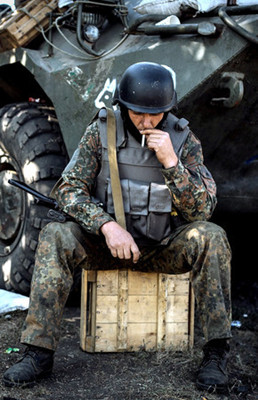俄羅斯和烏克蘭
A brief intermission
課間休息
The ceasefire holds uneasily, but tension in eastern Ukraine will still trouble the governments in both Kiev and Moscow
停火維持不易,東烏緊張局勢仍困擾烏俄雙方政府
THE war in eastern Ukraine has quietened, for now. Its disparate factions have as much reason to keep fighting as to put away their guns. But a ceasefire signed on September 5th in Minsk is so far mostly holding. Ukraine's president, Petro Poroshenko, does not want to fight an unwinnable war against Russia, which is the situation he would have been in had he pressed on with Kiev's “anti-terrorist operation” in the east. His Russian counterpart, Vladimir Putin, is happy to see Donetsk and Luhansk turn into breakaway territories that can serve as instruments against Kiev.
發生在東烏克蘭地區的戰爭暫時停止,但內部紛爭依舊。它內部完全不同的派別有許多原因繼續戰爭,停火也一樣。但是9月5日在明斯克簽署的停火協議迄今為止仍在生效。在東部強行推行基輔的“反分裂運動”,讓烏克蘭總理佩特羅·波羅申科并不打算在這樣的情況下與俄羅斯展開一場毫無勝算的戰爭。它的俄羅斯伙伴,弗拉迪米爾·普京則非常高興看到頓尼茨克與盧甘斯克轉向領土分離,并且表示可以提供例如武器一類的支持來反抗基輔方面。

From the outset the Kremlin has been advocating a permanent ceasefire, not from humanitarian impulses but because it likes the idea of frozen conflict-zones in the east of Ukraine. The political mood in Kiev spurred Mr Poroshenko to press on as long as Ukrainian forces had momentum. But the incursion by Russian troops with heavy weapons in late August showed that Mr Putin would not allow Kiev a military victory. Without direct NATO aid, Mr Poroshenko felt forced to make a deal.
從克里姆林宮提倡永久停火開始,并非出于推行人道主義角度,因為這是一個凍結烏克蘭東部戰爭區的計劃。基輔的政治環境刺激波羅申科,只要烏克蘭人民武裝力量露出苗頭,他就要去鎮壓。但是俄羅斯重型武裝軍隊在八月末的入侵表示了普京不會允許基輔方面的軍事勝利。沒有北約組織直接的指示,波羅申科處理起來力不從心。
In the short term this will seem like a victory for Moscow. It has a mechanism to influence Ukrainian politics, much as it has in Moldova and Georgia. For as long as the status of Donetsk and Luhansk are undefined Ukraine cannot possibly join NATO. Mr Putin will have noted that his insertion of regular Russian soldiers met criticism but little action from abroad. Barack Obama declined to call it an invasion, but rather “a continuation of what's been taking place for months now”. The European Union will apply new sanctions next week, but describes them as “reversible”, perhaps to show that it is reluctant to isolate Russia. This week Russia's Gazprom cut gas supplies to Poland in an effort to stop resupply back to Ukraine.
在短期內來看這似乎是莫斯科當局的勝利,它用一種特別的技巧去影響烏克蘭政局,很大程度上如同它對摩爾多瓦與格魯尼亞所做的一樣。長期以來頓尼茨克與盧甘斯克的情勢都不明確,烏克蘭不可能加入北約。普京將會注意他插手俄羅斯正規軍,遭到了一小部分國家的批評。奧巴馬拒絕稱其為一場“入侵”,而是“最近幾個月正在發生的一切都是一種擴張”。歐盟下周將會啟動新的制裁,但把俄羅斯描述成“叛徒”,也許是為了表示他們隔離俄羅斯是無奈之舉。這周俄羅斯天然氣工業股份公司切斷了對波蘭的天然氣供應,以防止他們二次供應給烏克蘭。
The war has felt distant to most Russians. State television has manipulated its narrative of the conflict to soothe viewers' feelings of inadequacy and imperial nostalgia, while talking up Western plots and machinations. A poll by the Levada Centre found that 77% of those surveyed said America was the main initiator of Kiev's operations in the east. The secret burials of Russian paratroopers killed in Ukraine, only to be disavowed by the Russian state, have proved uncomfortable. But compared with the short-lived season of protest three years ago, Russian society seems docile and unthreatening. Another Levada poll found only 8% willing to join protests if they started, against 21% in 2011.
這場戰爭對于絕大多數俄羅斯人來說是十分遙遠的。當在發生西方陰謀論的時候,州立電視臺通過控制電視臺對于爭執的描述,去安慰觀眾們的不完全帝國主義懷舊情結。勒瓦達中心的一項民意調查發現,77%的被調查民眾說美國是基輔在東部活動的主要發起者。被俄羅斯政府所否認的,隱瞞了傘兵在烏克蘭遭遇不測的消息,已經引起了民眾的不滿。但是和三年前短命的抗議相比,俄羅斯社會看起來十分溫順不成威脅。另一項勒瓦達民意測試發現如果俄羅斯和烏克蘭開戰,只有8%的民眾會加入抗議活動,與2011年的21%相反。
Yet Mr Putin's adventurism and revanchism will create new dangers for his regime. A falling rouble and a Kremlin-imposed ban on food imports from America and Europe means that inflation could hit 8% next year. That may spur a level of social discontent which the war itself has not. Existing sanctions, and the prospect of more to come, are dragging down Russia's already faltering economy. Morgan Stanley forecasts a recession in 2015. Rosneft, Russia's biggest oil producer, has asked the government for $40 billion to refinance its debts. Global oil prices have dipped below $100 a barrel, whereas the Russian budget is calibrated to balance at a price between $110 and $117 a barrel. Plugging those holes will be costly: Mr Putin must make awkward choices over what interests to offend. His likely response to economic hardship will be to blame Russia's enemies abroad for starting a new cold war.
但普京的冒險主義和復仇主義將會給俄羅斯爭權帶來新的危險。貶值的盧布和克里姆林宮對從美國和歐洲進口食品的禁令也意味著通貨膨脹可能在明年達到8%。這可能會進一步刺激社會不滿的程度,而戰爭本身卻不會。現有的制裁以及未來前景將會拖累俄羅斯早已搖搖欲墜的經濟。摩根史坦利投資公司預測俄羅斯在2015年將會有一場經濟衰退。俄羅斯最大的石油生產商——俄羅斯石油公司,向政府索要4億美元來償還債務。全球石油價格已經降至100美元一桶,而俄羅斯卻通過將每桶油價調整到110美元至117美元之間來平衡財政。堵住這些缺口耗資巨大:普京必須要在得罪什么樣的利益之間做一個尷尬的決定。而他對經濟困難的回應將會被國外反俄勢力指責為要開始新一輪冷戰。
In Kiev Mr Poroshenko faces his own difficulties—which may materialise well before Mr Putin's. He says he will introduce a law next week to create a “special status” for Donetsk and Luhansk. Many questions remain, however: not least, whether Ukraine will manage to regain control over its eastern border with Russia, a decisive factor in assessing if the pro-Russian insurgency can ever be pacified. All sides disagree over how much territory should fall under Mr Poroshenko's self-rule provision. Kiev sees only areas under rebel control—around a third of the two regions—with this status, but the rebels' leaders lay claim to the whole of Donetsk and Luhansk. Such issues will weigh on Ukraine's parliamentary election next month. Yuriy Yakymenko of the Razumkov Centre, a Kiev-based think-tank, says that, though most voters support peace in principle, the fate of Mr Poroshenko and his political block will come down to the question, “Peace at what price?”
在基輔,波羅申科面臨他的困難—這些困難是在普京做出關于烏克蘭的各項決定之前就存在的。他說他下周將會宣布一項針對頓尼茨克和盧甘斯克的“特別時期”法律。即使有很多問題殘留,然而:相當重要的一點是,無論烏克蘭是否將要設法重新奪回它與俄羅斯接壤的東部邊界的控制權,親俄派叛亂能否被評定都將是評估中的一項非常重要的因素。且各方都在爭執有多少領土應該歸屬在波羅申科的自治規定下。基輔只看到了叛亂者控制下的地區—大約是頓尼茨克和盧甘斯克地區的三分之一—但是叛亂者首領在這種情況下對外宣稱整個頓尼茨克與盧甘斯克都在他們的控制之下。這些問題都將會影響下個月的烏克蘭議會選舉。基輔主要智庫—拉祖姆科夫中心的尤里·雅基門科說,即使絕大多數選民在原則上支持和平,但波羅申科與他政治團隊的命運將在這個問題上出現下滑,“和平值多少錢?”
More immediately, much hinges on whether the ceasefire will keep holding. Mr Poroshenko says that Russia has pulled back 70% of the troops it had inside Ukraine. Yet fighting has flared up and then died down in Mariupol, around Donetsk airport and in several other places. At the same time prisoners are being exchanged. A bigger upsurge in violence could easily reignite the entire conflict.
更直接地,在停火協議是否能夠繼續維持方面有太多的“鎖鏈”。波羅申科說俄羅斯必須撤除他們在烏克蘭境內70%的軍隊。但是在頓尼茨克機場周圍以及其他幾個地方突然發生的抗爭,隨后在馬里烏波爾消失。同一時間,俘虜們也正在被交換。一場更大的暴力高潮可以很輕易地重燃已經熄滅的爭端之火。
On the Ukrainian side of the lines most soldiers appear relaxed, but few believe the ceasefire is anything but a respite. Visiting Mariupol on September 8th, Mr Poroshenko said the war was over and now Ukraine had to win the peace. That may be wishful thinking. Rebel leaders still aim to separate from Ukraine. Sergei Baryshnikov, a member of the rebel “parliament”, says a long military and political fight lies ahead. The rebel state of Novorossiya, he says, should eventually comprise all of the Black Sea coast to the borders of Romania and Moldova. And then it will become part of Russia, he adds.
在烏克蘭邊境線上絕大部分士兵表現得輕松,但有極小部分相信停火只是期望。在9月8日訪問馬里烏波爾,波羅申科說戰爭已經結束,現在烏克蘭用和平取勝。那也許是一廂情愿的想法。叛亂者頭目依然把從烏克蘭分裂出去作為目的。叛亂者“議會”的議院的謝爾蓋·巴雷什尼科夫說長期的軍事政治斗爭擺在面前,諾沃羅西斯克的叛亂州應該包括黑海沿岸到羅馬尼亞與摩爾多瓦邊境的全部地區。他又補充道,然后他們全部會變成俄羅斯的一部分。












